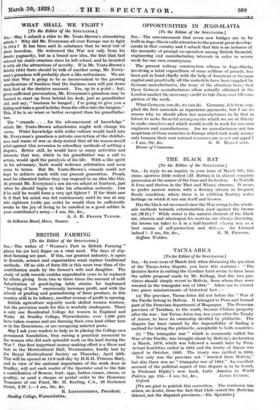WHAT SHALL WE FIGHT ?
[To the Editor -of the SPECTATOR.] Sig,—May I submit a rider to Mr. Yeats-Brown's stimulating article ? Why did Mr. Everyman all over Europe run to fight in 1914 ? It has been said in substance that he .sient -hilt- of sheer boredom. He welcomed the War not onlir. from his innate pugnacity, but as a brand new idea, the first that had entered his static cranium since he left school, and he. invested it with all the attractions of novelty. If in Mr. Yeats-Brown's fateful 1964 there should be talk of another scrap, Mr. Every- man's grandson will probably show a like enthusiasm. We are told that War is going to be so inconvenient to the growing ramifications of business that the business men will put down their foot at the decisive moment. Yes, up to a point ; but, given sufficient provocation, Mr. Everyman's grandson may be trusted to.start up from behind his desk, just as grandfather did, and say, " business be hanged ; I'm going to give you a biding and take a good holiday from the office into the bargain." This, if he is no wiser or better occupied than his grandfather was.
The " crusade . . . for the advancement of knowledge " which Mr. Yeats-Brown adumbrates might well change his views. Wider knowledge with wider culture would instil into Mr. Everyman's grandson a private conviction of the childish- ness and waste of war so deep-rooted that all his reason would rebel against this reversion to schoolboy methods of settling a dispute. Better still, he would have so many activities and interests that war, which to his grandfather was a call to action, would spell the paralysis of his life. With a like spirit in his adversary, both would welcome arbitration and soon come to terms. But Mr. Yeats-Brown's crusade could not hope to achieve much with our present generation. People must be educated before they can respond to an idea like this. At present Mr. Everyman's son leaves school at fourteen, just when he should begin to take his education seriously. Can it be said he would form a very apt fighter ? If the State saw to it that his mind was fed continuously until he was at any rate eighteen (codte que codte) he would then be sufficiently awake to the joy of living to be enrolled as a good soldier in
your contributor's army.—I am, Sir, &c., -


















































 Previous page
Previous page